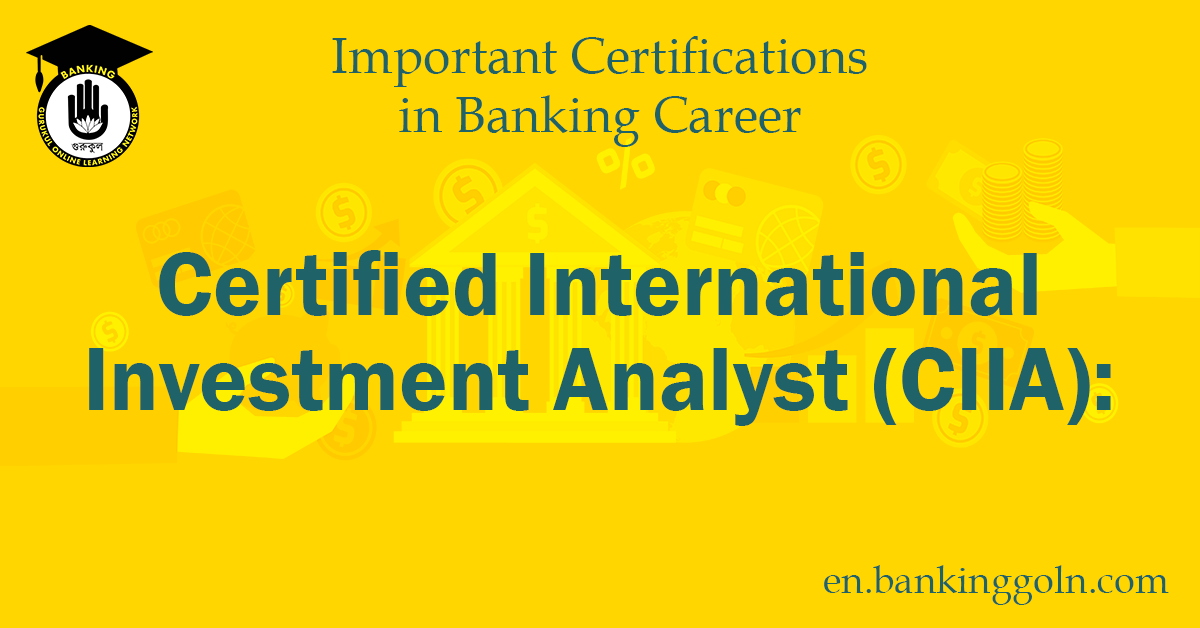In the dynamic and evolving landscape of global finance, an increasing number of financial professionals strive to differentiate themselves from their peers by attaining prestigious certifications. The Certified International Investment Analyst (CIIA) designation is one such recognition that has gained significant global prestige over the years. This certification, awarded by the Association of Certified International Investment Analysts (ACIIA), is coveted by investment professionals worldwide, including financial analysts, portfolio managers, and investment advisors. This article presents an in-depth exploration of the CIIA certification, its importance, eligibility requirements, examination process, career prospects, and comparison with similar credentials.
Certified International Investment Analyst (CIIA)
Understanding the CIIA Certification
Established in 2000, the ACIIA, a Switzerland-based organization, confers the CIIA certification. This designation aims to elevate the proficiency and ethical standards of investment professionals, enabling them to make informed decisions and offer valuable advice to clients on international investment matters.
The CIIA certification is recognized in more than 60 countries globally. As a testament to its rigorous curriculum and stringent examination process, the CIIA-certification is considered equivalent to a master’s degree in financial analysis in some regions.
The Importance of the CIIA Certification
In an era of economic globalization, the CIIA certification enables financial professionals to develop a comprehensive understanding of international investment analysis, portfolio management, and ethics. Holders of this certification are equipped with in-depth knowledge and skills to address the complex challenges arising from fluctuating global markets.
Moreover, the CIIA-certification reinforces ethical conduct in the investment profession, emphasizing fiduciary responsibility and adherence to a high standard of professional conduct. This fosters trust among clients and employers, thereby enhancing career prospects.
Eligibility Requirements for CIIA Certification
To pursue the CIIA certification, a candidate should possess a relevant degree and a minimum of three years of professional experience in the investment field. In some cases, the ACIIA may accept five years of experience as a substitute for the academic qualification. The experience should encompass areas like financial analysis, portfolio management, or investment advice.
Further, candidates need to be members of a national or regional society affiliated with the ACIIA to be eligible for the CIIA examination.
The CIIA Examination Process
The CIIA examination is divided into two parts: the Common Knowledge Exam and the National/Regional Exam. The Common Knowledge Exam covers topics such as financial analysis, corporate finance, portfolio management, and ethics.
The National/Regional Exam, on the other hand, focuses on country-specific or region-specific financial regulations, tax regimes, and institutional structures. This dual-structure examination ensures that candidates possess comprehensive knowledge of both international and local investment dynamics.
Both exams are typically held twice a year and are conducted in the candidate’s local language or in English. The exams employ a combination of multiple-choice questions and case study-based questions to evaluate the candidate’s practical application of knowledge. The pass rates for these exams are typically lower than other financial certifications due to the comprehensive and rigorous nature of the exams.
Career Prospects for CIIA Holders
The CIIA certification can open up a plethora of opportunities for investment professionals. Given its international recognition, CIIA holders can work across different geographic locations and in varied roles. These may include financial analyst, portfolio manager, investment advisor, risk manager, and more.
Furthermore, the CIIA certification can also aid career advancement. Many firms prefer candidates with CIIA-certification for senior roles due to their advanced analytical skills and ethical standards.
CIIA Certification vs. Similar Credentials
The CIIA certification is often compared with other prominent certifications such as the Chartered Financial Analyst (CFA) and the Financial Risk Manager (FRM) designations. While all these certifications equip professionals with robust financial knowledge, each has its unique focus and global acceptance.
The CFA designation, conferred by the CFA Institute, focuses on investment management, including investment analysis, portfolio strategy, and corporate finance. In comparison, the FRM designation, awarded by the Global Association of Risk Professionals, is geared towards professionals interested in risk management.
On the other hand, the CIIA certification maintains a broader focus, covering international and local investment dynamics, thus equipping professionals with a more diverse skill set. The CIIA also carries the advantage of strong local adaptability due to its dual structure examination.
However, the choice between these certifications depends on the individual’s career goals, geographical preferences, and the specific requirements of their role in the finance industry.
In summary, the Certified International Investment Analyst (CIIA) certification stands as a prestigious recognition for investment professionals worldwide. It offers a comprehensive curriculum that arms professionals with extensive knowledge of international and local financial markets, ethical standards, and investment practices.
While the path to CIIA certification may be challenging, it can prove to be a career-defining choice for those passionate about global finance. With its potent mix of international and localized knowledge, the CIIA certification holds immense potential for finance professionals aiming for career growth and global opportunities.
Through the CIIA certification, financial professionals can not only enhance their credibility but also contribute towards strengthening the ethical fabric of the global investment industry. As the world continues to become a global village, the CIIA certification is set to play an even more vital role in shaping the future of the global finance industry.
See more:
- GOLN Technology in Banking Book: Table of Contents
- GOLN Risk Management In Banking Book: Table of Contents
- GOLN Mobile Banking Book : Table of Contents
- GOLN Cyber Security in Banking Book : Table of Contents
- GOLN Banking & Financial Services Compliance Management Book : Table of Contents
- TOC of Career in Banking
- Certified International Investment Analyst Wikipedia
